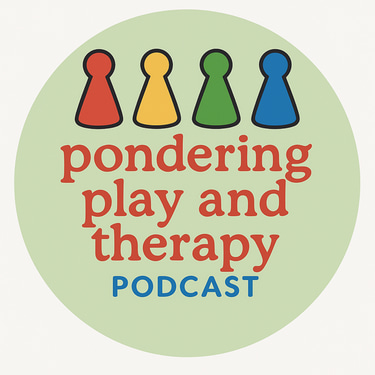Play and Criminal Justice – An Interview with Joe Franks
When you think of play, you probably imagine laughter, movement, exploration, and safety. But what happens when children grow up without those things—when survival, not curiosity, drives their development? In a recent episode of Pondering Play and Therapy, I had the privilege of speaking with Joe Franks, a mental health nurse turned justice reformer, who sheds light on the intersections of play, trauma, and the criminal justice system.
Philippa
8/8/20253 min read


Joe began his career in mental health nursing back in 2004, working across inpatient units and learning disability services. Like many of us in therapeutic fields, he grew frustrated with the limitations of the medical model and turned to a more relational, systemic approach. His journey led him through academia, frontline prison work, leadership in NHS liaison and diversion services, and now to his own consultancy focusing on clinical reviews of deaths in custody.
But it’s not just the settings Joe has worked in that are powerful—it’s what he has seen.
Prisons Filled with Vulnerability
Joe shared what many working in the system already know but the public rarely sees: prisons and police cells are filled with vulnerable people—often care-experienced, neurodivergent, living with the effects of brain injuries, or with complex trauma histories.
“What struck me most,” Joe said, “was the number of young men in prison who had experienced significant trauma—many of whom had been let down time and time again. If that had been me, I might’ve ended up there too.”
Joe described the system as not so much criminal justice, but criminal response to unmet need. The notion of “equivalence of care”—that people in custody should receive the same health services as those outside—is a principle rarely lived out in practice.
Liaison, Diversion, and the Power of Play
In his role leading Liaison and Diversion services, Joe’s teams operated at the critical intersection between health and criminal justice—assessing people in custody suites and courtrooms, with the aim of steering them toward help rather than punishment.
For children, diversion becomes even more urgent. Many are already disengaged from education, health, and supportive adults. Joe reflected on the importance of early, meaningful engagement—often something as simple as access to play, hobbies, or trusted adults.
“People would be surprised at how many young people have never gone fishing, never had a hobby. Some were being taken to football clubs or fishing trips, and for the first time they were engaging with someone who saw their strengths, not just their risk.”
When children live in high-risk environments, play isn’t just fun—it’s risky, restricted, or entirely missing. Helping young people rediscover safe connection is a protective factor against further offending.
The Language We Use
Our conversation touched on the language of “naughty” or “bad”—a common reaction when young people offend. But Joe was clear: these are trauma responses. Survival behaviours. Lying, stealing, aggression—these often reflect the only tools a child has developed to get their needs met.
Joe highlighted the importance of maintaining empathy as children age. “When they’re young, we see the trauma,” he said. “By the time they’re teenagers, people just see bad behaviour. But nothing’s changed—except maybe that the system ran out of understanding.”
Reconnection After Release
Joe also described the “Reconnect” service—a new initiative that supports individuals as they leave custody. Many face homelessness, addiction, poor mental health, and no community ties. Without support, reoffending is tragically common. Reconnect steps in to offer practical support, referrals, and most importantly—relationship.
One powerful element of Reconnect is the use of staff with lived experience—people who have served time, recovered, and now offer peer support. “They bring credibility and understanding in a way professionals can’t replicate,” Joe shared.
EMDR: Trauma Therapy with a Future in Justice
As Joe’s work evolves, he’s now trained in EMDR (Eye Movement Desensitisation and Reprocessing), a trauma-focused therapy gaining attention across sectors. He believes EMDR could be a game-changer in offender rehabilitation—offering a brief, effective way to process deeply rooted trauma.
In Joe’s words: “At the heart of so many labels—personality disorder, depression, anxiety—is unresolved trauma. EMDR helps people work through that distress in a contained, often rapid way.”
He hopes to bring EMDR into criminal justice settings in a more widespread way—and with his experience, insight, and compassion, he may just be the person to do it.
Final Thoughts
Joe’s journey reminds us of an uncomfortable truth: for many, the road to prison begins with a lack of safety, nurture, and play. Systems that criminalise trauma perpetuate cycles of harm. But Joe also shows us that with the right people in the right places—listening, advocating, and bringing humanity to harsh systems—change is possible.
At the heart of this change is the simple but powerful truth: play matters. Connection matters. And no one—not even those in custody—is beyond the reach of healing.
To hear the full interview, listen to the episode on Pondering Play and Therapy.
🔗 Connect with Joe Franks: https://www.linkedin.com/in/joseph-franks-5bb0a878/
📚 Further Reading:
The ACEs Study – CDC-Kaiser Permanente Adverse Childhood Experiences Study
Nadine Burke Harris TED Talk on ACEs and Toxic Stress
Have thoughts on this episode? Want to share your experiences with play, trauma, or criminal justice? Join the conversation on Instagram @ponderingplayandtherapy.
